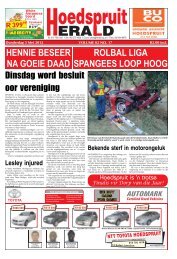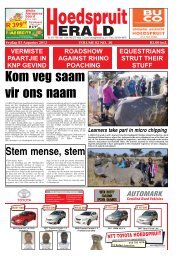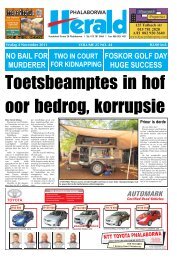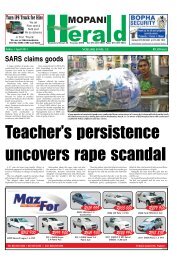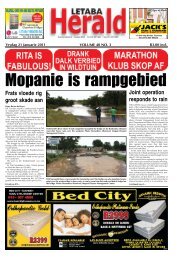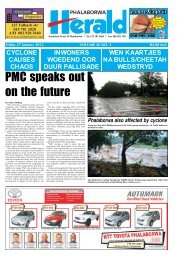You also want an ePaper? Increase the reach of your titles
YUMPU automatically turns print PDFs into web optimized ePapers that Google loves.
F E AT U R E<br />
Careers in Agriculture -<br />
what you should know!<br />
Theo Bekker<br />
A RECENT article in a South African newspaper,<br />
The Sunday Times, shed some light<br />
onto career opportunities in South Africa with<br />
the title "Spotlight on new trends in the job<br />
market" (Published:Aug 10, 2008).<br />
In the article it stated: "The index does not<br />
include employment in agriculture and the<br />
informal economy, referred to as "the bakkie<br />
brigade"."<br />
This tongue in the cheek reference to employees<br />
in the agricultural sector as being a<br />
bakkie brigade got me thinking: Is it still the<br />
general perception that the formal agricultural<br />
sector only comprises out of farmers with a<br />
"bakkie-tan", who drives around all day and<br />
drink coffee on the veranda? (Car manufacturers<br />
have exploited this idea infinitely in<br />
television advertisements.) And if so, why<br />
aren't more people interested in agriculture as<br />
a career field?<br />
C.S. Lewis said "What you see and hear<br />
depends a good deal on where you are<br />
standing; it also depends on what sort of<br />
person you are." And where you are standing,<br />
according to me, is a choice you make!<br />
What do we choose to "see and hear"?<br />
Globally, agriculture is under pressure due<br />
to an increase in production costs and the<br />
implications it has on a farming operation.<br />
Coupled to this, urbanization is still taking<br />
place, leaving huge social burdens on farming<br />
communities.<br />
In South Africa new laws and regulations has<br />
caused widespread panic in the agricultural<br />
sector. The land reform policy, with the resultant<br />
insecurity regarding land claims is a<br />
burden almost all farmers have to bear.<br />
Water, labour, BEE and tax laws contribute to<br />
this mounting "see and hear" snowball that<br />
seems to threaten agriculture in South Africa.<br />
All of this (and more) is a true threat.<br />
However, lets change our vantage point and<br />
view some facts about agriculture:<br />
" The human race will always have to eat.<br />
The world population stands at 6,733,164,238<br />
(and counting) and food demand is ever<br />
increasing. Coupled to this, agriculture is a<br />
universal science; meaning training in a specific<br />
county does not influence your employment<br />
potential anywhere else in the<br />
world.<br />
" Even though land reform will, according to<br />
many projections, be part of the South African<br />
landscape for quite a while still, numerous<br />
government officials have voiced there concern<br />
over food shortages, and the government<br />
has taken a firm stand on the importance of<br />
food security, not only to provide for South<br />
Africa, but also for the rest of the continent.<br />
" Agriculture is based on sound scientific<br />
facts and relies on research to move forward.<br />
This means that not every Joe Soap can be<br />
employed in the industry, and that people with<br />
sound knowledge and experience is needed.<br />
" A growing scarcity of trained people/ of<br />
talent in the agriculture sector is starting to<br />
develop, meaning great opportunities exist.<br />
"… the frontiers for competition in certain<br />
segments of the industry have shifted away<br />
from securing job vacancies to the identification<br />
of scarce talent in those areas where<br />
skills are in short supply.<br />
Whilst certain sectors of the South African<br />
economy are booming such as the construction,<br />
mining and agricultural sectors, other<br />
sectors are in decline ...." RL Pike, CEO of<br />
LETABA HERALD - Vrydag 22 Mei 2009<br />
Adcorp, a leading provider in South Africa of<br />
staffing, human capital management and business<br />
process outsourcing services. The reason<br />
for this scarcity is not only a growing agricultural<br />
sector, but also a lack of new employees<br />
being trained at formal training facilities.<br />
At South African universities, the amount of<br />
final year students (studying degrees) being<br />
trained in Horticulture, Agronomy and Soil<br />
Science does not exceed 50 in total. This has<br />
been the case for a number of years.<br />
How can we change prospective students'<br />
"see and hear"?<br />
Prospective students interested in agriculture<br />
should be informed of the following:<br />
" There is a wide range of employment<br />
sectors to choose from with an agricultural<br />
plant sciences background. Industries within<br />
this sector that employ plant scientists include<br />
propagation (nurseries, seed companies etc),<br />
production and management (farms and estates),<br />
product handling (packhouses, packaging<br />
material suppliers etc), marketing and<br />
exports (local markets, government, export<br />
companies), supply chain management (supermarkets,<br />
pre-packers, distributors), research<br />
(universities, government etc), training<br />
(Universities, training colleges) and landscape<br />
design, amongst others.<br />
" There are vacancies available in the South<br />
African agricultural sector, and this need is<br />
likely to rise within the next few years. (Take a<br />
look at websites like www.agrijob.co.za.)<br />
" There are bursaries available in the ag-<br />
PAGE 17<br />
ricultural sector. The Subtrop website<br />
(www.subtrop.co.za) will soon be up and<br />
running, and there will be links to the Lindsey<br />
Milne bursary, as well as other bursary opportunities<br />
for agricultural sciences students.<br />
" There are willing people in the industry that<br />
will show prospective students around, giving<br />
them more insight into what it is that they are<br />
doing. If you are looking at specific career<br />
opportunities in the agricultural sector, please<br />
contact me so we can arrange a meeting with<br />
relevant persons within the sector you are<br />
interested in (theo@subtrop.co.za).<br />
Prospective agricultural students normally<br />
have an agricultural background. It is these<br />
surroundings that influence their perception<br />
about agriculture. It is therefore important that<br />
you as part of the agricultural community<br />
begin to be aware of the opportunities that<br />
does present itself in the agricultural sector;<br />
not only in South Africa, but also in the world.<br />
Be positive about the industry. Maybe change<br />
where you are standing with relation to what<br />
you hear, to see and hear the truth about<br />
employment in the agricultural sector and to<br />
influence people around you in a positive<br />
w a y.<br />
In future articles, I will try and focus on<br />
specific study fields within agriculture, highlighting<br />
the advantages of the specific course,<br />
give examples of employment opportunities<br />
with a similar qualification, and maybe give<br />
real life examples of people in the industry,<br />
and their perceptions about the agriculture<br />
and the way forward.




